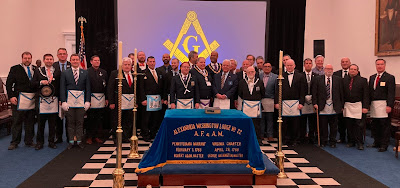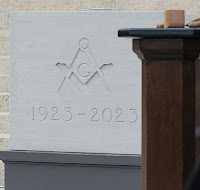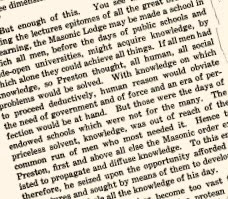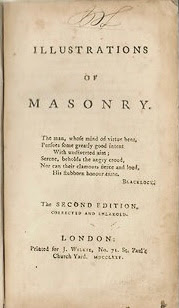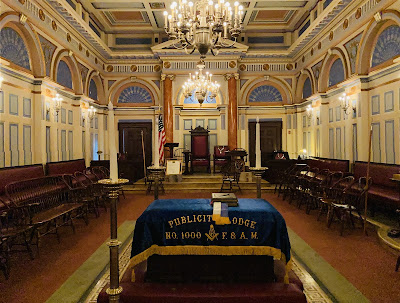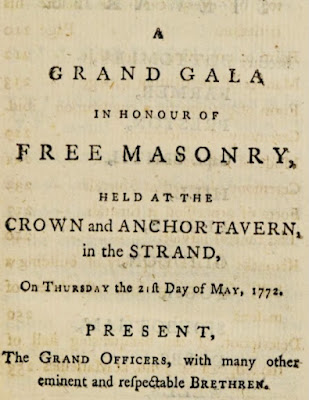 |
| CIPSH |
Logic teaches us to guide our reason discretionally in the general knowledge of things, and to direct our inquiries after truth, as well for the instruction of others as our own improvement. It consists of a regular train of argument, whence we infer, deduce, and conclude, according to certain premises laid down, admitted, or granted. In it are employed the faculties of conceiving, judging, reasoning, and disposing; all of which are naturally led on from one gradation to another, till the point in question is finally determined.
William Preston
Illustrations of Masonry
1775
Logic. The art of reasoning, and one of the seven liberal arts and sciences, whose uses are insulated in the second degree. The power of right reasoning, which distinguishes the man of sane mind from the madman and the idiot, is deemed essential to the Mason, that he may comprehend both his rights and his duties. And hence the unfortunate beings just named, who are without the necessary mental quality, are denied admission to the Order. The Old Constitutions define logic to be the art “that teacheth to discern truth from falsehood.”
Albert Mackey
An Encyclopædia of Freemasonry and Its Kindred Sciences
1874
Logic is that science which directs us how to form clear and distinct ideas of things, and thereby prevents us from being misled by their similitude or resemblance. Of all the human sciences, that concerning man is certainly most worthy of the human mind, and the proper manner of conducting its several powers in the attainment of truth and knowledge. This science ought to be cultivated as the foundation or groundwork of our inquiries; particularly, in the pursuit of those sublime principles which claim our attention as Masons.
Middle Chamber Lecture
Standard Work and Lectures
Grand Lodge of New York
Looking around the world today, evidence of logic might not be obvious, but today is World Logic Day nevertheless. Most regular Freemasons in the United States are instructed, to some extent, in Logic during the lecture of the Fellow Craft Degree. Maybe your lodge employs the New York version above or something similar, or perhaps something closer to the Preston quotation at top. They suffice. Logic is essential in understanding Geometry. In understanding anything, really. With logic, for example, one studying Masonic history is immune to silly Templar nonsense notions. But what of the history of logic? As far as we know, this dates back about 2,500 years to Aristotle. Sure, many philosophers have defined logic since Aristotle’s time, but he was the first. Or at least his writings are the earliest still extant, so we have to start with him.
 |
| H. Cart de Lafontaine |
In “The Seven Liberal Arts and Sciences,” his Prestonian Lecture for 1930, Henry Philip Cart de Lafontaine (fascinating man!), while Master of QC2076, writes:
Logic is the name given to one of the four main departments of philosophy. It is the science of the processes of inference. There are three types of inference: the first being from particular to particular, which is called analogical inference; the second is from particular to universal, which is inductive inference; the third is from universal to particular, which is deductive inference.
We will illustrate these three types in order to give a clearer meaning, and we will employ the names of three Greek cities in the illustrations, though any others might quite as well be substituted.
Suppose I say, “Border war between Thebes and Phocis is evil,” and then make the further statement that “Border war between Thebes and Athens is similar to that between Thebes and Phocis.” From these two, I draw the analogical inference that “Border war between Thebes and Athens is evil.”
Again, I may say that “Border war between Thebes and Phocis is evil,” and follow up that assertion with the assertion that “All border war is like that between Thebes and Phocis.” From these two statements I draw the inductive inference that “All border war is evil.”
I now start with this inductive inference that “All border war is evil,” and I follow on with the statement that “Border war between Thebes and Phocis is border war,” and draw the conclusion by deductive or syllogistic inference that “Border war between Thebes and Athens is evil.”
You will see that this is rather like an algebraical problem; by eliminating certain factors, you arrive at a definite conclusion of analogy, induction, and deduction. We owe to Aristotle this triple distinction.
World Logic Day is the creation of the sometimes illogical and detestable UNESCO, which proclaimed the first such observance for this date in 2019. That proclamation says, in part:
The ability to think is one of the most defining features of humankind. In different cultures, the definition of humanity is associated with concepts such as consciousness, knowledge and reason. According to the classic Western tradition, human beings are defined as “rational” or “logical animals.” Logic, as the investigation on the principles of reasoning, has been studied by many civilizations throughout history and, since its earliest formulations, logic has played an important role in the development of philosophy and the sciences.
Despite its undeniable relevance to the development of knowledge, sciences and technologies, there is little public awareness on the importance of logic. The proclamation of World Logic Day by UNESCO, in association with the International Council for Philosophy and Human Sciences (CIPSH), intends to bring the intellectual history, conceptual significance and practical implications of logic to the attention of interdisciplinary science communities and the broader public.
A dynamic and global annual celebration of World Logic Day aims at fostering international cooperation, promoting the development of logic, in both research and teaching, supporting the activities of associations, universities and other institutions involved with logic, and enhancing public understanding of logic and its implications for science, technology and innovation. Furthermore, the celebration of World Logic Day can also contribute to the promotion of a culture of peace, dialogue and mutual understanding, based on the advancement of education and science.
So, if your lodge meets today, be sure to rise when permitted and tell the brethren about World Logic Day, and maybe even toast this occasion during the Festive Board—especially if you work Logic ritual.








































































